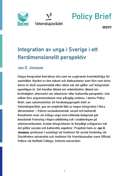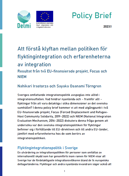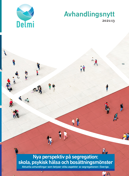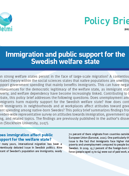According to the study participants, small towns appear to be characterized by the same anonymity and indifferent encounters typically associated with larger cities. While such indifference may not necessarily result in immediate negative consequences for individuals, over time, it can significantly affect their access to resources. Small towns are associated with both higher and lower thresholds for newcomers' integration into society. To fully understand these dynamics, it is essential to examine newcomers' own experiences.
This analysis is based on a qualitative study that includes semi-structured interviews with 24 individuals and six focus group interviews with a total of 34 participants. Data were collected between April and August 2022 in six small and medium-sized Swedish municipalities (Olofström, Ludvika, Hudiksvall, Trelleborg, Gävle, and Jönköping). The interviewees, aged 20–60, were born in Syria, Afghanistan, Iraq, Jordan, Eritrea, Yemen, Turkey, as well as the regions of Chechnya and Palestine. Of the participants, 44% were women.
The Policy Brief is part of the EU-funded project “Exploring the Integration of Post-2014 Migrants in Small and Medium-Sized Towns and Rural Areas from a Whole of Community Perspective” (Whole-COMM, 2020–2024), which analyses the integration dynamics of migrants who arrived in several European countries, including Sweden and Canada, after 2014 and settled in smaller towns.
Key conclusions and recommendations:
- Anonymity and indifference in small towns: According to the participants, small towns are marked by a similar anonymity and indifference that are typically associated with larger cities. While indifference is a recurring theme in the interviewees' narratives, it manifests differently in various social settings. As a result, the findings have different policy implications depending on the context.
- Labour market as a key meeting point: For some participants, encounters in the labour market have been crucial to their continued life in Sweden. However, as the interviewees indicate, this requires workplaces to be structured in ways that promote equal and trust-building interactions. For newcomers employed in municipal and regional sectors, obstacles to meaningful exchanges between staff from different backgrounds can be addressed through improved scheduling and organisational development.
- Schools as social spaces: Meetings in schools are generally described as friendly but marked by a sense of indifference. Broader policy efforts to address inequalities in living conditions between newly arrived youth and other young people could help mitigate some of the challenges highlighted by participants. Such initiatives can be implemented at the municipal, regional, and national levels.
- Hostility and xenophobia in public spaces: Participants' experiences of hostility, especially in public places, suggest that indifference is not the only issue shaping newcomers' interactions with the local community. There is a clear need for targeted efforts to support victims of crime and to combat xenophobia on a larger scale.
About the author
Måns Lundstedt is currently a postdoc at the Department of Sociology and Work Science, Gothenburg University.
Policy Brief was published October 29th, 2024.
Photo by Hans Peter Gauster via Unsplash






